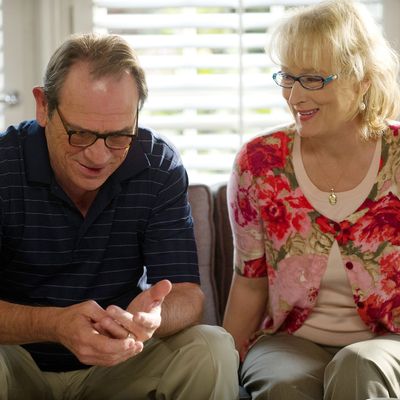
The painfully mild postmenopausal chick flick Hope Springs — which stars acting legends Meryl Streep and Tommy Lee Jones as ordinary middle-class people with a nonexistent sex life — is sure to pack them in on Movie and Bingo Night at the old-folks’ home. The more ambulatory, however, will find it rough-going. I passed the time imagining Divine in both roles.
In despair because her husband, Arnold (Jones), is emotionally distant and won’t touch her that way, frumpy Kay (Streep) buys plane tickets to Hope Springs, Maine, to consult with couples therapist Dr. Feld, played by Steve Carell. That’s a promising setup for a sexagenarian sex comedy, but Carell decided to give his personality a few weeks off for the picture — he’s so earnest he seems squeegeed. The minimal laughs come from Jones’s deadpan squirminess at the idea of openly discussing his sex life: You’d think it was 1950 and Dr. Kinsey was boldly going where no non-perv has gone before. After one frustrating session, Kay wanders into a seaside bar, has a couple of glasses of white wine, and, like an elderly spinster saying “Damn!” for the first time, tells her troubles to the seen-it-all bartender (Elizabeth Shue) — who asks her customers for a show of hands from people who aren’t Getting Any. The whole bar roars in solidarity. If you think that’s a hoot, you’ll love Hope Springs.
Now and then, the screenwriter, Vanessa Taylor, deftly captures the peculiar non-communicative communication between two people who’ve been together for 30-odd years, their kids grown and gone — the unstated but implicit idea being that when a man’s sex drive goes, he suddenly has no reason for intimacy. But visually the movie is dead on the screen. Director David Frankel, who gave Streep her comeback role in The Devil Wears Prada, handles every therapy scene as gently and discreetly as if he’s Dr. Feld.
While the camera loiters patiently on each of the actors, we learn that Kay didn’t want Arnold for a few years, but he stayed faithful. Then he tore something (I forget what), started snoring, and moved into the guest room. It’s possible Taylor meant these revelations to have an undercurrent of anger — maybe Arnold is unconsciously paying Kay back for the all that time she withheld her favors. I’m reaching, though. As the film is directed, Kay and Arnold are so scrubbed of anything dark or idiosyncratic — I guess to make them more “universal” — that they could be named Mr. and Mrs. Bland. Streep and Jones make themselves small: She’s chirpy; he’s crusty. Incessant pop standards on the soundtrack supply the emotion the director can’t. All that’s missing are commercials for estrogen cream and erectile-dysfunction meds.
It’s true that in a culture in which our objects of fantasy are all young and freakishly fit, even something as vanilla as the sight of Jones gingerly caressing Streep’s bare thigh can seem shocking, even transgressive. Alas, that says more about Americans — and Hollywood — than it does about the picture.


